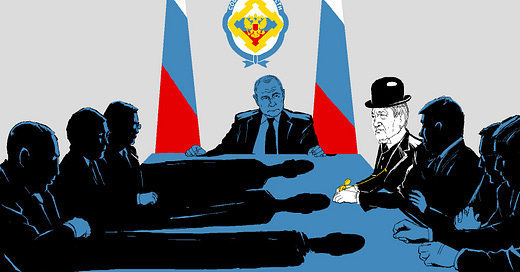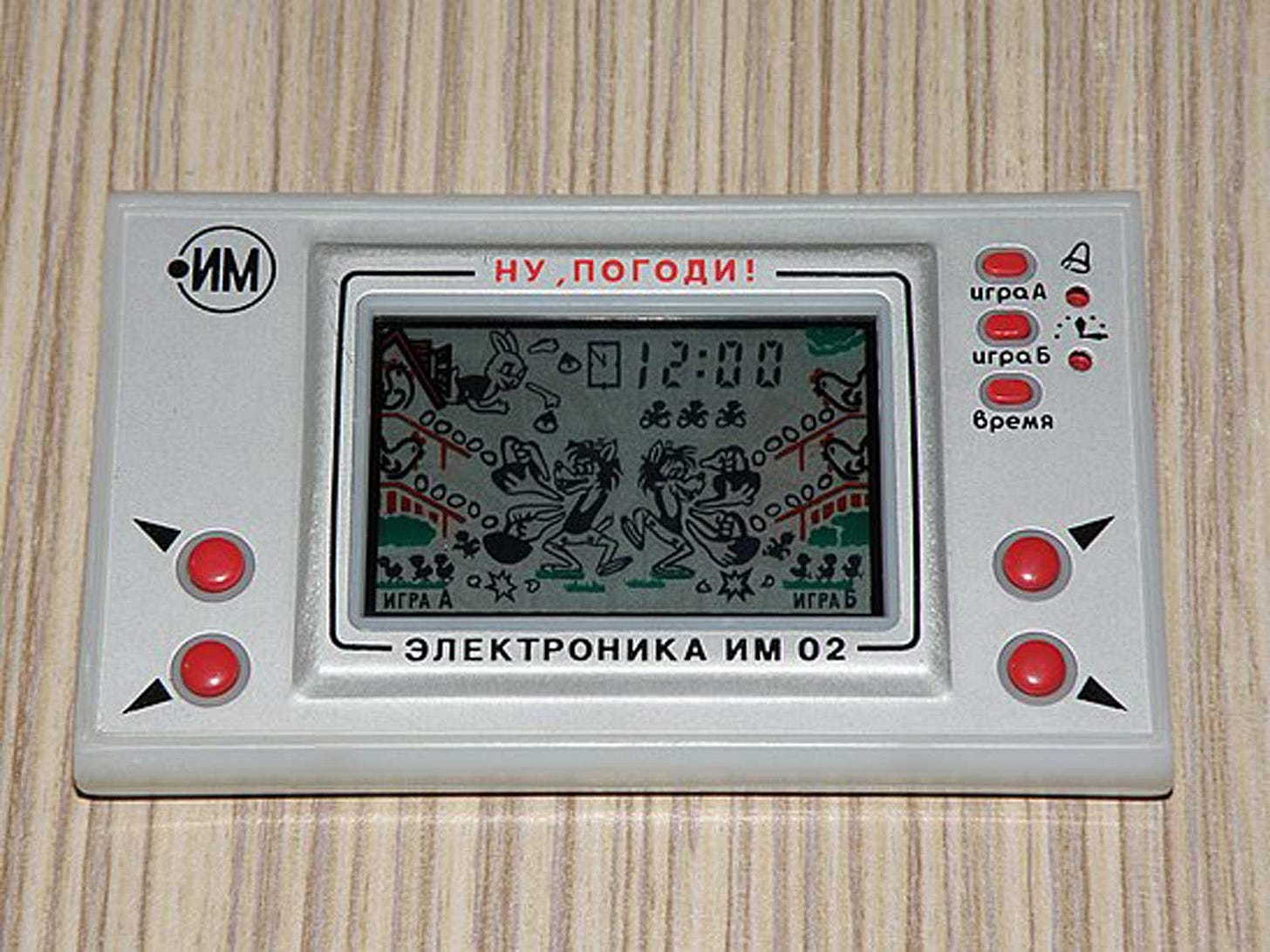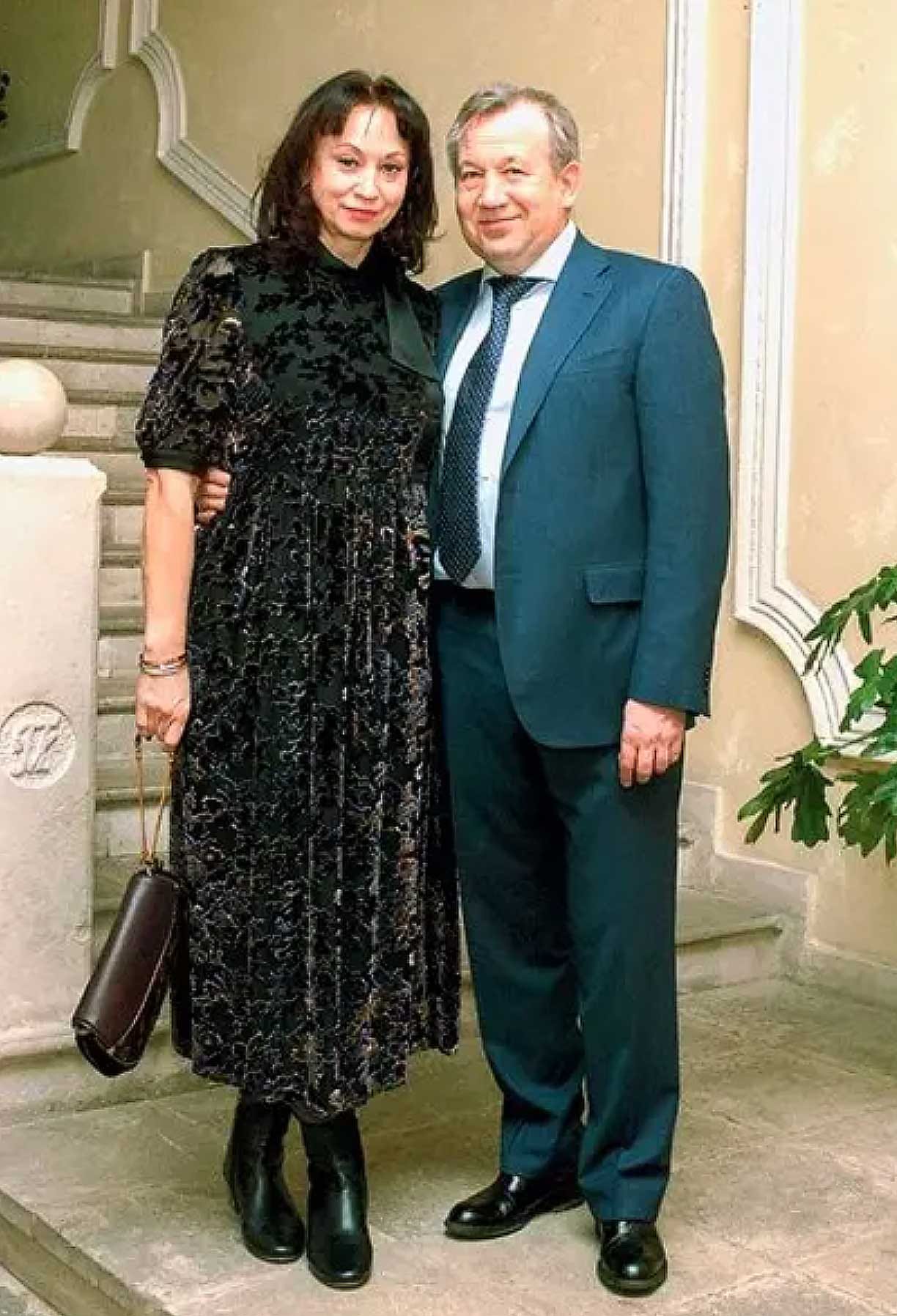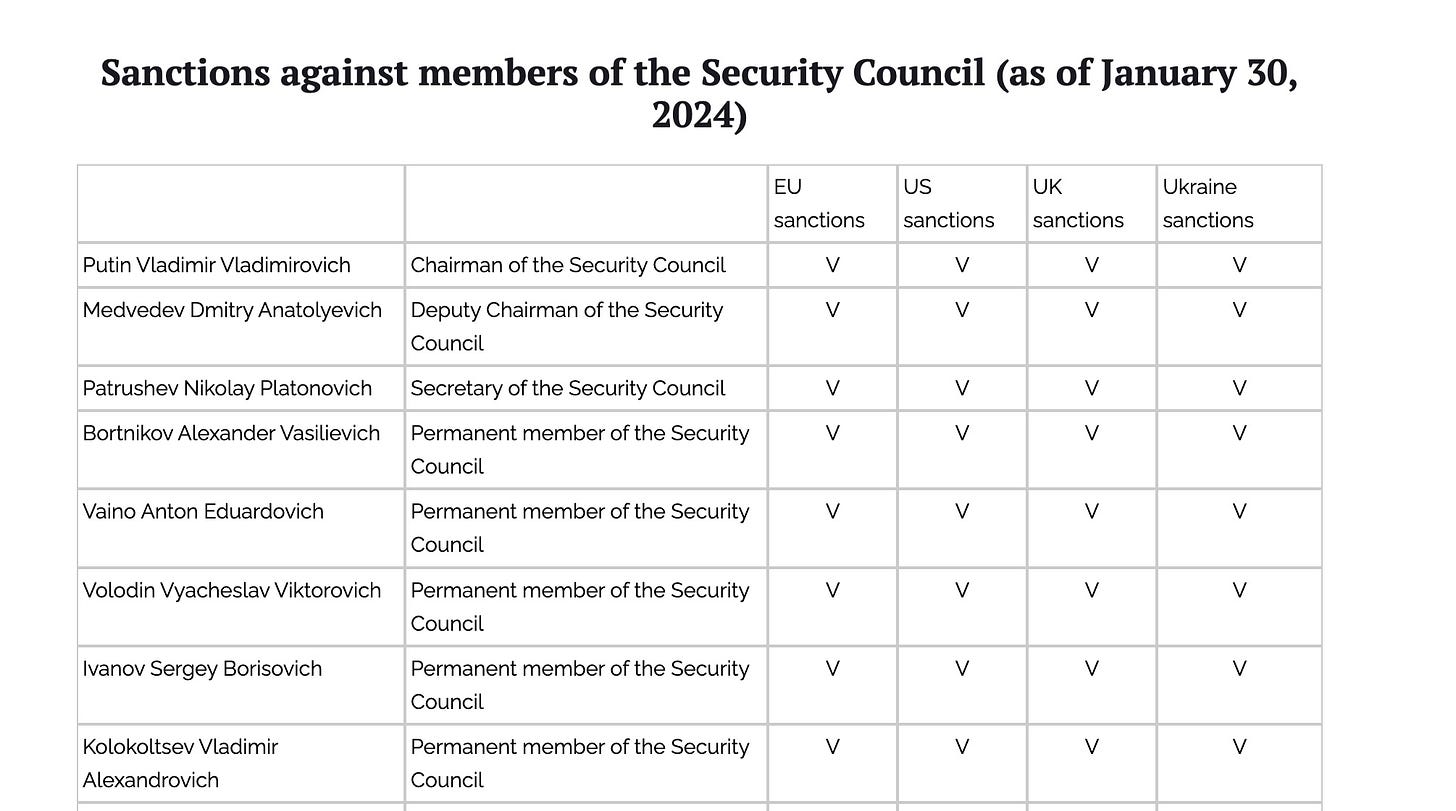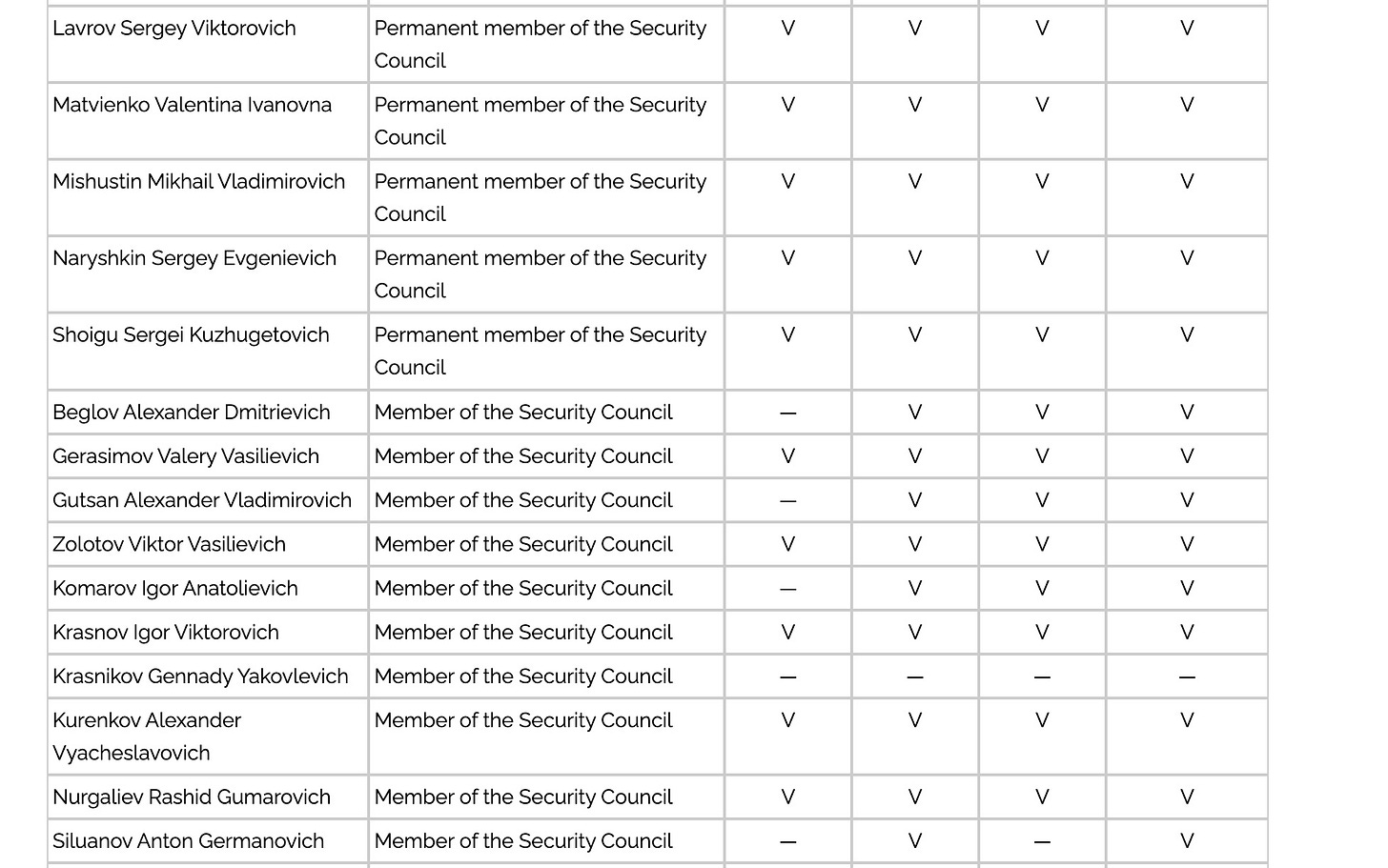Dossier Center Translation: The British business of a new member of the Security Council
Why the head of the Russian Academy of Sciences Gennady Krasnikov has something to lose from international sanctions
January 30, 2024
Translation from Dossier Center investigation
Vladimir Putin recently included Gennady Krasnikov in the Russian Security Council. This is a scientist and academician who has been heading the Russian Academy of Sciences (RAN) for more than a year. At the moment, Krasnikov is the only member of the Security Council against whom no sanctions have been imposed. However, it could be very painful for the academician and his family. The fact is that Krasnikov’s wife Svetlana owns a stake in one of the largest Russian insurers, the Energogarant company, through a British company, the Dossier Center has learned.
Energogarant strives to be friends with high-ranking security officials. In 2003, the insurer established a sports fund at Bolshaya Lubyanka, 1/3 - right in the FSB building complex. The then deputy director of the FSB, current Colonel General Viktor Komogorov, was invited to head this fund. Over the next twenty years, Energogarant acted as a permanent sponsor of the foundation’s events. And not only him - Komogorov himself, after retiring, received a warm position as an adviser to the general director of an insurance company. This is not the only such example: former military men with lobbying capabilities and their relatives regularly sat on the board of directors of Energogarant.
Who is Gennady Krasnikov
Gennady Krasnikov is 65 years old, and before his appointment to the Security Council, he managed to manage several sanctioned enterprises. Krasnikov began his career in the 1980s at the Zelenograd Mikron plant. Mikron mainly worked for the defense industry but also released a series of games called Electronics (the most popular of them, “Well, Just Wait!”, the wolf caught eggs in a basket). By 1991, Krasnikov managed to head Micron.
In 1994, a controlling stake in the plant was bought by AFK Sistema owned by Vladimir Yevtushenkov. The Rosbalt agency claimed that Krasnikov played an important role in the deal: having bought vouchers from workers, he resold them to Yevtushenkov’s company. After this, Krasnikov headed Mikron for many years, and in 2016 he was appointed to oversee all Sistema projects related to microelectronics.
From 2011 to 2023, Krasnikov was the general director of the Scientific Research Institute of Electronics (JSC NIIME) from the same Zelenograd and now has become the scientific director there. The institute calls itself a leading institution in the field of micro- and nanoelectronics. It is part of the Element group of companies, a joint project of Sistema and the Rostec state corporation. In May 2022, the Americans imposed sanctions against both NIIME and Krasnikov’s native Mikron plant. NIIME was accused of carrying out contracts for the Russian government, while Mikron was accused of producing chips for the Mir bank card.
In the fall of 2022, Krasnikov became the new president of the Russian Academy of Sciences. The elections were accompanied by a scandal; the current head of the academy, Alexander Sergeev, for some unknown reason withdrew his candidacy, saying that many members of the Russian Academy of Sciences were “subject to external administrative pressure.” Another applicant was rejected by the Russian government without explanation. As a result, Krasnikov turned out to be virtually the only candidate and won the elections, although some academicians called for a boycott.
In January 2024, Putin, by decree, introduced the academician to the Security Council. This is very uncharacteristic because the other members of the Security Council are federal officials, security officials, heads of regions, and plenipotentiary representatives of the president in the districts, but not scientists.
How the family of the new Security Council member is connected to Great Britain
Having headed the RAS, Krasnikov left most of the companies associated with AFK Sistema, remaining only the scientific director of that very sanctioned NIIME, as can be seen from the register of legal entities.
However, the main money for the academician’s family comes from his wife’s business – the Energogarant insurance company. The website says that it is one of the largest insurers in Russia. The report for 2021 (the latest available papers) says that the value of its assets is more than 22 billion rubles, and revenue from insurance premiums is about 16 billion.
What kind of business is this and where did it come from in the family of an academician? Energogarant appeared in the early 1990s, it was founded by the energy company RAO UES and regional power engineers who needed a company to insure their facilities. RAO was then headed by Anatoly Dyakov - and it was his family that received a large stake in the new insurer. However, in 1998, internal conflicts in RAO worsened - so much so that one day Dyakov was simply not allowed into his own office. Subsequently, RAO UES was headed by Anatoly Chubais. In 2015, Dyakov died, and his family continued to own a share in Energogarant: his wife Tatyana and two daughters - Larisa Sokolova and Svetlana Krasnikova, the wife of Gennady Krasnikov.
Now this family controls 33% of the shares of Energogarant, as calculated in the Dossier. This comes in two parts. Firstly, Krasnikova, Sokolova, and Dyakova have a Russian company, Atlas, which owns 20% of the insurer’s shares. Secondly, they own a third of the British company Preferred Management Limited (PML), which also owns 40% of Energogarant. The remaining share of Energogarant - two-thirds - belongs to the former general director Andrei Zernov and his entourage.
It is important to understand that Gennady Krasnikov is not just the husband of the business co-owner. The academician himself was actively involved in the affairs of Energogarant, and especially in the internal struggle of shareholders. For example, in the decision of the British court on the corporate conflict within PML, Krasnikov’s name is mentioned 17 times. The document states that in 2011 Krasnikov, who formally does not hold any positions at Energogarant, actually discussed the future fate of this business along with the shareholders. And in 2013–2016, he also had an official position - he was on the board of directors of Energogarant, as can be seen from the reports.
Will the newly appointed member of the Security Council now rush to get rid of compromising business in an unfriendly NATO country? It will not be easy for Krasnikov to do this because of the same corporate conflict. The fact is that Krasnikov’s side tried to throw Zernov out of business, taking away part of his share, and restoring the chronology of the conflict in the “Dossier.” A criminal case was opened against the top manager, and he fled to Germany. However, it has not yet been possible to completely take over his business. It is Zernov who controls two-thirds of the British PML, having appointed his own director there. The Krasnikov family has already tried to leave the British company, but, apparently, Zernov does not give them good conditions (read more about this conflict below).
How the families of the founders of Energogarant have been fighting among themselves for many years
In 2004, the company Preferred Management Limited (PML) was created in the UK, and 40% of the shares of the Russian insurer Energogarant were registered with it. PML belonged to trusts and secretarial firms and was backed by three Russian businessmen with equal shares: Anatoly Dyakov, Andrey Zernov, and Alexey Matveev. It was believed that all three made equal efforts and made an equal contribution to the creation and development of Energogarant - such words were heard many years later in the British court.
A few years later, Matveev sold his share to Zernov and went out of business. Thus, Zernov had two-thirds of PML, Dyakov - one-third.
In 2015, Anatoly Dyakov died, and his heirs soon began a war with Zernov, the permanent general director of Energogarant. They believed that the top manager was pocketing part of the money by passing it past the cash register. There was probably a reason for this: for example, a tax audit for 2014–2016 showed that 775 million rubles were paid by Energogarant - through European companies - as a reinsurance premium to two unknown Kyrgyz firms. These companies were located at the same address, had the same telephone number, and their nominal owners during interrogations stated that they had nothing to do with them. In addition, the papers of these companies were allegedly lost while they were stored in a container at the market. The money received from Kyrgyzstan was transferred to the UK, where it was finally dissolved (all this is described in court decisions).
Dyakov's heirs - Krasnikova and her family - in 2017 achieved the initiation of a criminal case against Zernov, after which the top manager flew to Germany and never returned to Russia, and today is wanted. However, this did not prevent Zernov and his circle from continuing to own businesses in Russia and the UK, controlling two-thirds of Energogarant.
The Krasnikov family has been trying to get out of the British business for several years, but they have been unable to reach an agreement with Zernov on its division - things are so bad that in 2018, Krasnikov’s side even went to the British court. At first, they demanded either that PML be liquidated or that the partner be obliged to exchange their PML shares directly for Energogarant shares.
However, then the Krasnikovs suddenly changed their version: they remembered that supposedly back in 2004, Dyakov, Zernov, and Matveev agreed that if one partner leaves the business, his shares are divided in half between the remaining partners. Thus, Zernov should have given Dyakov half of the shares received from Matveev many years ago. However, he did not do this, leading Dyakov by the nose until his death. Academician Krasnikov heard exactly this kind of talk in 2011. Therefore, the plaintiff insisted, that part of the PML shares should be given to them now just like that (we are talking about half of 1/3, that is, approximately 16.6% of the shares).
The British judge was not impressed by this version and refused to divide the PML. The next hearing - not in favor of the Krasnikovs - took place at the end of 2022.
How security officials and retired political instructors were welcomed at Energogarant
After Anatoly Dyakov left RAO UES, the Energogarant company gradually lost orders from power engineers. However, it managed to survive by becoming a universal insurer.
A reliance on friendship and cooperation with high-ranking security officials helps in this. In 2003, Energogarant became one of the founders of the Military Sports Foundation (MSF), registered at Bolshaya Lubyanka, 1/3 - in the FSB building complex. This is not an accident: the fund’s board of trustees was headed by the deputy director of the FSB and the head of the 5th service, Viktor Komogorov. He retired in 2009, but still heads the foundation's board, indicating on the website his rank - Colonel General of the FSB.
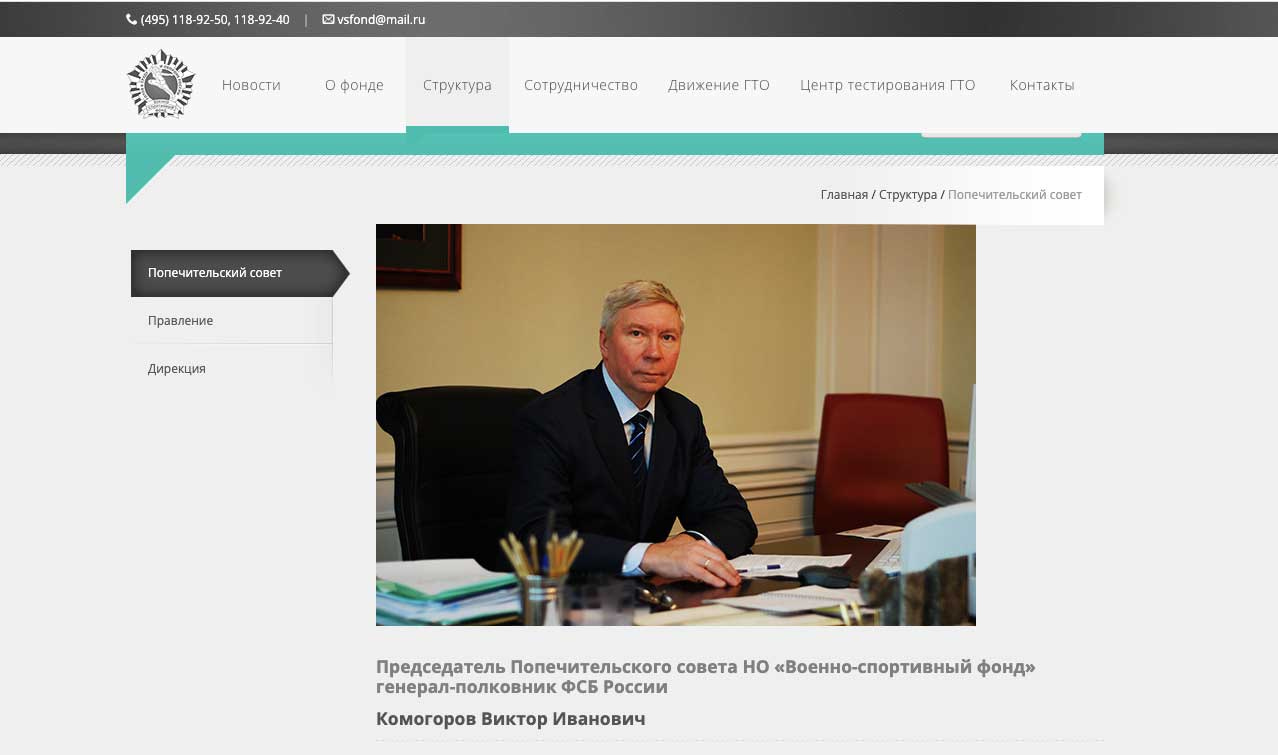
The WSF promotes mass sports, a healthy lifestyle, “spiritual morality” and patriotism, and holds events under the brand of the physical education movement “Ready for Labor and Defense” (GTO), created by the decree of Vladimir Putin. The sponsor of the foundation’s events from 2003 to the present day is the same Energogarant. And the permanent chairman of the fund’s board, Vadim Gavrilov, is a representative of Energogarant. On its website, the WSF never tires of emphasizing its closeness to the Russian authorities: meetings are held either in the General Staff of the Ministry of Defense, then in the Federation Council, or the “native” FSB.
Energogarant took care not only of the sports fund but also directly of the retired Colonel General Viktor Komogorov. In 2018, the ex-silovik was appointed advisor to the general director of the insurance company, and in 2019 he joined the board of directors, the reports say.
Energogarant generally practiced attracting people with a vague present and military background to the board of directors (BoD). A striking example is retired colonel Igor Efimov, who sat there from 2009 to 2015. Efimov runs the regional public organization Army Komsomol, which has not left any traces of its activities on the Internet. Efimov’s other post is deputy chairman of the board of directors of the National Association of Reserve Officers of the Armed Forces (“Megapir”). On the website, you can find information that the association has built a network of Daria shopping centers (how they are connected with reserve officers is kept silent). Efimov's military background is clearer: in 1985–1990, he served as assistant to the head of the main political department of the Soviet Army and Navy, in other words, he was a high-ranking political instructor.
A certain Alexander Aleksandrovich Kanshin also spent two years on the Energogarant board of directors. As they found out in the “Dossier”, this is the son of Alexander Nikolaevich Kanshin, who heads the mysterious “Megapir”. However, Kanshin Sr. also has clear lobbying capabilities: for example, he is the deputy chairman of the Public Council under the Russian Ministry of Defense and a member of the Public Chamber. Before entering the reserve, Colonel Kanshin also managed to serve as a political instructor in both the Soviet and Russian armies.
Why membership in the Security Council is a guaranteed way to fall under international sanctions
Let's return to Gennady Krasnikov and his new post in the Security Council. This organization appeared in 1992, then it consisted of 14 people, including the chairman, President Boris Yeltsin. The current Putin Security Council already has 31 members. The secretary since 2008 is Nikolai Patrushev, a former director of the FSB, the chairman is Putin, and the deputy chairman is Dmitry Medvedev.
All members of the Security Council, except Gennady Krasnikov, are under American and Ukrainian sanctions, the Dossier analysis shows. The UK made another exception by not including Finance Minister Anton Siluanov on its list. The European Union is even more selective: they imposed sanctions against only 22 of the 31 members of the Security Council.
However, for London, participation in the Security Council is already a sufficient reason to send a person under sanctions, as can be seen from British explanations. The British explain their sanctions against Alexander Gutsan, Igor Komarov, Anatoly Seryshev, Yuri Trutnev, Vladimir Ustinov, Igor Shchegolev and Vladimir Yakushev by their membership in the Security Council - all of them are plenipotentiary representatives of the President of the Russian Federation in the federal districts and, except for Trutnev, Ustinov and Shchegolev, little known to the general public People.
“On February 21, 2022, the Russian Security Council supported the proposal to recognize Donetsk and Lugansk as independent republics,” the British emphasize in their documents (the video of this meeting is available here).
If this attitude against the Security Council continues now, then adding Gennady Krasnikov to the British list is a matter of the near future.


